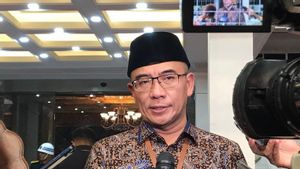JAKARTA – AI technology is increasingly popular among the public, because it is considered to provide a number of benefits. According to a survey, Indonesia is one of the countries most optimistic about the future of AI.
Reported by Stanford Computer Science, artificial intelligence (AI) is the science of engineering the creation of intelligent machines, involving mechanisms to carry out a task using computers.
Artificial Intelligence is a technology that allows computer systems, software, programs and robots to "think" intelligently like humans. The artificial intelligence of a machine is created by humans through complex programming algorithms.

The concept of artificial intelligence was first discovered after World War II by young mathematician and philosopher Alan Turing in 1947. According to Alan, if humans can process information and solve problems and make decisions from that information, then machines can do it too.
Since it was first conceived, AI has continued to develop with the aim of creating intelligence that is similar to humans.
The rapid development of AI in recent years has given rise to pros and cons among the public. On the one hand, the presence of AI can help human work, but on the other hand, artificial intelligence can threaten employment.
The Influence of AI in Life Increases
As a technology that has been and will continue to be utilized by humans, a number of questions arise from the perspective of its users. For example, can AI technology accurately imitate the way humans work?
Does the implementation of AI really help life or does it become an unimportant technology? So what about the concern that AI will replace human functions or jobs and so on.
When the internet is able to blur national boundaries, the opinions of the world's population on these questions can differ. This happens because of differences in culture, behavior, and perhaps the level of education of each community group.
Therefore, we cannot equate the habits of using technology of Indonesians with Swedish people, for example.
One survey conducted by Ipsos in 2022 and 2023 showed that the perception that AI technology will have an impact on life in the next three to five years increased by six percent from the initial 60 percent.

The selection of this period is important not only to see the differences in public perception over time, but also the fact that ChatGPT, which is referred to as a milestone in AI history, was released publicly during this period.
Although it only presents data from 2023, most respondents from Indonesia agree with this statement, namely at least 79 percent of the total population.
However, the highest optimism is held by the South Korean people with 82 percent, followed by Turkey with 81 percent. On the other hand, respondents from France and Belgium are the most skeptical that the implementation of AI will affect their lives, namely only 52 percent, slightly below Canada with 51 percent.
The optimism of the Indonesian people is further strengthened by the population supporting the statement that AI-based products and services have more benefits than disadvantages.
"Indonesian respondents were recorded as the highest, namely 78 percent. Above Thailand 74 percent and Mexico 73 percent," as quoted by Netray.

But this is in contrast to the United States, which is the most skeptical country about this statement, followed by France with 37 percent.
"In terms of ratio, as many as 54 percent of the world's population in 2023 agree with it or an increase of two percent compared to the previous year," added Netray.
Indonesian Respondents are Most Confident
Back to the global opinion graph from a survey published by Stanford University entitled "Artificial Intelligence Index Report 2024". The level of respondents' confidence in understanding AI-based products and services also increased by three percent from the previous year.
Thus, it can be interpreted that the use of this technology is increasingly accepted by the public from year to year. Including the level of confidence that respondents know which types of products and services use artificial intelligence even though it only increased by one percent.
Based on the survey, Indonesian respondents again ranked at the top.

Of the total survey respondents in Indonesia, 84 percent felt that they understood what artificial intelligence technology was. Followed by respondents from South Africa and Thailand at 78 percent.
The level of confidence of the world's population in understanding AI technology itself is quite high. Only in the lowest position, namely Japan, it was recorded at 43 percent. The rest are above 50 percent, such as Italy at 53 percent.
The use of AI technology today is sufficient to handle a number of human needs. From handling repetitive work, to helping produce creative work.
SEE ALSO:
Seeing the high enthusiasm of the Indonesian people for AI technology, Netray Artificial Intelligence API is here as a solution for professional workers. Netray's intelligence technology currently includes Netray Translate to facilitate the translation process and Natural Language Processing to extract a number of important entities from unstructured text data.
The English, Chinese, Japanese, Arabic, and French versions are automatically generated by the AI. So there may still be inaccuracies in translating, please always see Indonesian as our main language. (system supported by DigitalSiber.id)


















